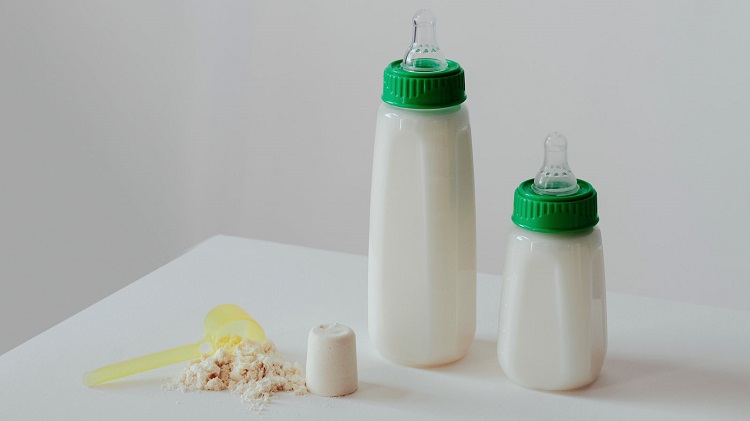Are you a Breastfeeding mom, who is finding it difficult to keep to the recommended exclusive breastfeeding of a baby for six months? Are you wondering whether you can supplement your baby’s food with formula?
Don’t worry, in this article, we discuss the question “is it ok to mix breast milk and formula? We also discuss few things that you should also consider before mixing formula with breast milk.
Why Mix Formula And Breast Milk?
Mixing formula with breast milk is not a bad idea and there are a lot of reasons why mothers may decide to try combination feeding and they include
- To Get Extra Sleep: Sometimes waking in the middle of the night to breastfeed a crying child can have its toll on the mother. This is not an easy job especially if the mother had a busy day during the day; this can night feeds extremely difficult. Therefore, supplementing breast milk with formula can get your partner more involved. The father or the partner of the mother can use a feeding pumped breast milk and formula to feed the baby while the mother gets enough sleep.
- Low Milk Supply: Some women naturally produce a low quantity of milk which may not be enough for the baby, this can make exclusive breastfeeding very difficult to achieve. The only alternative becomes a mixture of breast milk and formula so that the baby is not deprived of the natural nutrients from the mom’s breast milk. Hence, the insufficient quantity of the mom’s breast milk is supplemented by the formula added.
- Your Baby Has Medical Issues: Sadly, if your child is born with certain health issues or is born prematurely, they may need more than just breast milk. Introducing formula is often done to help a baby gain weight.
- Going Back To Work: Some mothers are ok with combining formula feeding and breast milk feeding due to the convenience it provides to be able to meet up the nutritional needs of their child.
- Mother of Multiples: Being a mother of multiples can be challenging and demanding when it comes to breastfeeding. Keeping up with the milk demands of two or more babies can leave you feeling depleted or feeling dry, so a combination method may be of immense help to you.
- Your Partner Wants to Be Involved: Your partner may not want to be left out during feedings (I’m sure you’ll love to share responsibility, too). You could pump and use your breast milk. Alternatively, you can give your baby a bottle of formula once in a while.
Read Also: How To Make Formula Taste Like Breast Milk
Is It Ok To Mix Breast Milk And Formula?

It is possible to mix both breast milk and formula and even in the same container, but make sure to adhere to the mixing instructions to avoid causing harm to your little one.
Improper mixing can lead to over-concentration of nutrients for your baby and that may be disastrous to your child’s health. This because babies digestive system is not fully developed to process things on their own
In as much as it is okay to mix breast milk with formula, you can use separate bottles for both or use the same bottle, but it is usually advised that separate bottles be used to avoid wastage of breast milk.
If the same bottle is used (that is both breast milk and formula are mixed) at the same time, and your baby do not finish it, everything becomes waste as a formula needs to be discarded within an hour of preparation, while breast milk can be kept refrigerated for about 4 hours, therefore a mixture of both will have to be discarded.
Read Also: How To Store Formula Milk For Night Feeds
Introducing Your Child To Formula
If there are other reasons why you’re not supplementing your child aside from medical reasons, experts recommend breastfeeding for at least one month before starting the formula.
Doing this provides you with the time you need to build up a healthy breast milk supply and also make sure that your baby is breastfeeding well. At this period, you can begin to add formula gradually.
While it is completely Ok to mix breast milk and formula in the same bottle and since they can lead to wasted breast milk, you can try introducing your baby breast milk first, and then finish the feeding with formula.
Remember
There are specific amounts of nutrients and calories embedded in a given volume of the infant formula, so in other to get the exact proportion of the nutrients you have to stick to the required recommendation. A standard formula contains 20 calories per fluid.
Do not combine breast milk with unmixed powdered formula. Always prepare the baby formula according to the manufacturer’s care guide, using the right amount of clean water.
Also, remember to talk to your pediatrician before the right infant formula for your baby. Most parents recommend an iron-fortified infant formula during the baby’s first year.
If you notice your baby is vomiting, diarrhea, fussiness, developing rashes, or gas after starting formula, this may be an allergy, but it’s best to consult with your baby doctor for guidance.
Read Also: What Happens If Baby Drinks Spoiled Formula Milk?
How To Mix Formula With Breast Milk
There are three types of formula namely: the concentrated liquid, powdered and ready-to-feed. When using the concentrated form or powdered form of the baby’s formula, make sure it is prepared according to the manufacturer’s instructions or alternative instructions recommended by your pediatrician.
The formula should be prepared separately from the breast milk, after preparation the infant formula can be added to a bottle of breast milk or can be given after a baby has been breastfed.
Breast milk should never take the place of water in the preparation of your baby’s formula unless you want to feed your baby with food that is too concentrated. This may pose a great bunch of trouble or difficulty for your baby’s immature system.
Also, undiluted powdered infant formula or even the concentrated liquid should not be added directly into the breast milk that you want to feed your baby.
The ready-to-eat form of formula is already diluted, therefore, no need for extra preparation, hence the name ready to eat, so it can be added directly to the breast milk, this kind of formula is safe for the baby.
Here is a video showing how to mix Enfamil formula with breast milk
How Adding Formula Affects You
1. Start One or Two Formula Bottles Each Day
Normally, your body makes breast milk based on the basics of supply and demand. As you start to add a formula, it can affect your breast milk production.
If you decide on supplementing one or two bottles a week, this shouldn’t affect your milk production. But if you feed your baby with one or two bottles of formula each day, your milk supply will begin to drop.
2. Add More Formula Bottles Slowly
If you’re not supplementing and all of a sudden you begin giving your baby a lot of bottles in a short period can cause problems such as breast engorgement, blocked milk ducts, and also gastrointestinal issues.
3. Try Pumping or Hand Expressing
Pumping or hand expressing can both help increase your breast milk supply and prevent some of the common breastfeeding problems that can happen when you skip nursing to bottle feed.
Removing your breast milk can help ease the fullness that breast engorgement can cause. Additionally, you can store your pumped breast milk properly for a later time. Mind you, breast milk can stay in the freezer for up to one year if stored properly.
Read Also: 13 Best Formulas That Taste Closest To Breast Milk
How Adding Formula Affects Your Baby
1. Baby May Wait Longer Between Feedings
Naturally, babies can digest breast milk far easily than infant formula. However, feeding your baby formula allows him to feel fuller longer, and with these, the baby may not look as hungry as quickly after formula feedings as they usually do after breastfeeding.
2. Baby May Refuse the Bottle
Some babies may refuse to take the bottle, especially if a mother is giving it to them. To ensure that the transition moves smoothly, have your partner or another caregiver offers the formula.
Besides simply wanting milk from the mother, some babies may find it difficult to make use of a bottle. Some babies may just dislike the taste of the formula.
3. Baby May Refuse Breast
Usually, after some time, bottle feeding is will no longer be an issue. As your baby gets comfortable with formula and drinking from a bottle, it can be difficult to change the routine.
You may find out that your baby will no longer want to nurse. Don’t worry, drinking from the breast can take more work, a lot of babies end up finding formula more satisfying.
4. Changes in Bowel Movements
Introducing formula to your baby’s diet can have a huge impact on the pattern, color, and consistency of your baby’s poop. The poop may be firmer, darker in color, and have a stronger odor than before. Your baby shouldn’t poop often once you start giving them formula.
Read Also: How To Store Formula For Daycare
Reasons Not To Mix Breast Milk And Formula
Now you’ve known it’s OK to mix your breast milk with an already prepared infant formula in the same bottle, there are other good reasons why you should offer each bottle at a time.
- You Don’t Want To Waste Your Breast Milk: When you offer your baby breast milk first, you reduce the chances that your baby doesn’t finish it. Letting your baby finish the breast milk you have on hand before offering him formula means that if your baby gets full before consuming everything offered, you’ll be throwing away extra formula rather than breast milk.
- Your Baby Will Reap All the Benefits Of Breast Milk: As you know, breast milk is enriched with lots of nutritional and health properties than formula, it is will benefit your baby if he gets all of the available breast milk.
Read Also: How To Transition From Breast Milk To Formula
Wind Up
We hope this article has given an in-depth discussion to answer the question, is it ok to mix breast milk and formula. Whether you’re breastfeeding, formula feeding, or mixing both, remember that the key thing is to ensure that your baby gets adequate nutrition and make sure that you don’t put your baby’s life in danger while achieving it.
